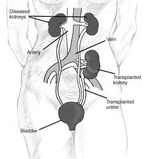Kidney Disease
Treatment
Different Treatments for Different Stages
There are several types of treatments related to kidney disease. Some are used in earlier stages of kidney disease to keep your kidneys healthier longer. These medications and lifestyle changes help you maintain kidney function and postpone kidney failure. Other treatments, such as dialysis and transplantation, are used in later stages of kidney disease. These methods help replace kidney function if your own kidneys have stopped working.
Treatments for Early Kidney Disease
Treatments for early kidney disease include both lifestyle changes and medications.
- Lifestyle changes, such as eating less and exercising regularly to maintain a healthy weight, can help prevent the diseases that cause kidney damage.
- If you already have diabetes and/or high blood pressure, keeping these conditions under control can keep them from causing further damage to your kidneys.
- Restricting your use of salt can be an important lifestyle change, as this helps control blood pressure.
- For people with greatly reduced kidney function, another change often recommended by experts is to follow a moderate-protein diet. Because protein makes your kidneys work harder, eating less protein may help delay progression to kidney failure.
Anyone considering dietary changes because of kidney disease should work with a dietitian to ensure that they are getting proper nutrition.
Medications
Medications can also help keep kidneys healthier longer. Two types of blood-pressure medications -- angiotensin-converting enzyme (ACE) inhibitors, and angiotensin receptor blockers (ARBs) -- have been shown to slow down kidney disease and delay kidney failure. These medications have been shown to work in people who have either diabetes or high blood pressure, and many other kinds of kidney disease, to protect kidney function.

Video length: 1 min 17 sec
Click to watch this video
Many people need two or more types of medicines to keep their blood pressure below recommended levels (130/80 mmHg) to keep the kidneys healthy. A diuretic (water pill) also can be important. Your healthcare provider will determine which medication or combination of medications is right for you.
Some older adults with kidney disease may be taking medications for other diseases as well. As kidney disease progresses, it is likely that the doctor will need to adjust the dosages of all medications being taken.
Treatments for Later Stages
If kidney disease progresses to kidney failure (sometimes called end-stage renal disease, or ESRD), the goal of treatment changes. Since the kidneys have now stopped working, the goal is to find treatments that can replace kidney function. There are two main options for this: dialysis and transplantation.
Two Kinds of Dialysis
Dialysis is a treatment to filter wastes and water from your blood. There are two major forms of dialysis: hemodialysis and peritoneal dialysis.

Video length: 1 min 32 sec
Click to watch this video
In hemodialysis, blood is run through an external filter and the clean blood is returned to the body. Hemodialysis is usually done at a dialysis center three times a week. Each session usually lasts between three and four hours.
Peritoneal dialysis is another way to remove wastes from your blood. This kind of dialysis uses the lining of your abdominal cavity (the space in your body that holds organs like the stomach, intestines, and liver) to filter your blood. It works by putting a special fluid into your abdomen that absorbs waste products in your blood as it passes through this lining. This fluid is then drained away. A key benefit of peritoneal dialysis is that it can be done at home, while you sleep.
Hemodialysis and peritoneal dialysis are treatments that help replace the function of the kidneys. These treatments help you feel better and live longer, but they don't cure kidney failure.
If You Are on Dialysis
Although patients with kidney failure are now living longer than ever, over the years kidney disease can cause problems such as
- heart disease
- bone disease
- arthritis
- nerve damage
- infertility
- malnutrition.
So to stay as healthy as possible for as long as possible while on dialysis, follow your doctor's recommendations, take your medications, and continue to follow the lifestyle and dietary habits you adopted to slow the progression of kidney disease.
Dialysis can be a special challenge for older adults, especially those who have other diseases or conditions. For example, hemodialysis requires that a person be able to leave home, travel to the dialysis facility, and sit for 4 hours during treatment. Peritoneal dialysis can be done at home, but requires someone to help. Often, older adults require assistance with some or all of these activities, and they and their families need to consider these issues as they choose treatment options and living facilities.
Kidney Transplantation
Instead of dialysis, some people with kidney failure -- including older adults -- may be able to receive a kidney transplant. This involves having a healthy kidney from another person surgically placed into your body. The new, donated kidney does the work that your two failed kidneys used to do. The donated kidney can come from an anonymous donor who has recently died, or from a living person -- usually a relative. But you might also be able to receive a kidney from an unrelated donor, including your spouse or a friend.
Kidney transplantation is a treatment for kidney failure -- not a cure. You will need to see your healthcare provider regularly. And you will need to take medications for as long as you have your transplant to suppress your immune system so it doesn't reject the transplanted kidney.
Choosing the Right Treatment
Not all treatments are right for all people. Be sure to talk to your doctor and other health professionals -- including nurses, dietitians, and diabetes educators -- to figure out the best treatment plan for you. The right choice for you depends upon your medical condition, lifestyle, and personal likes and dislikes.







